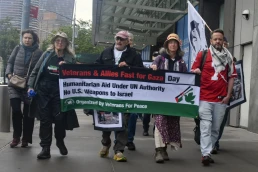More Afghan people may die from sanctions than from 20 years of war.
By Lee Fang, The Intercept
When the U.S. pulled out of Afghanistan in August, ceding to the Taliban, the country’s economy began a severe contraction — what the Financial Times calls “one of the worst economic meltdowns in history.” The sprawling crisis has left nearly 23 million people in extreme hunger, and at least 1 million children under the age of 5 are now facing the immediate threat of starvation, according to the United Nations.
As commerce ground to a halt, food and fuel prices skyrocketed, in large part due to economic sanctions placed on the Taliban by the U.S. As many as 300,000 Afghans have fled to neighboring Pakistan, and many more refugees may soon leave the country. There are even reports that some Afghans have resorted to selling their children in order to feed their families.

The Biden administration defends the sanctions by pointing to a series of exemptions designed to allow humanitarian aid. The Treasury Department has touted its role as a leading humanitarian donor to the people of Afghanistan and its work to ensure that funds flow “through legitimate and transparent channels” via official sanction exemption licenses.
But those humanitarian exemptions, overseen by the Treasury’s Office of Foreign Assets Control, are nowhere near enough, according to experts who spoke to The Intercept. The OFAC licenses, including new licenses released December 22, have not curbed the global chilling effect of the sanctions and are ineffective in preventing a spiraling disaster that could kill more Afghan people than nearly 20 years of U.S.-backed war and occupation.
Recent Posts
These Veterans Starved Themselves To Protest The War In Gaza
July 8, 2025
Take Action Now As food in Gaza becomes increasingly scarce, activists are pushing their bodies to the limit in solidarity.By Emmet Fraizer, The…
ICE Agents Are Terrorizing Los Angeles With Brutal Tactics
July 8, 2025
Take Action Now ICE agents have established a pattern of brutal use of force in immigration raids.By Jonah Valdez, The InterceptSince June 6,…
Talk World Radio: India Walton On Zohran Mamdani And Freezing Out ICE
July 7, 2025
Take Action Now India Walton, former Democrat nominee for mayor of Buffalo, NY, discusses Zohran Mamdani and the race for NYC mayor and how to deal…
How Climate Change Is Worsening Flooding And Heavy Rainfall
July 7, 2025
Take Action Now The latest science on the link between climate change and natural disasters — and how they may be playing out where you live.By…




